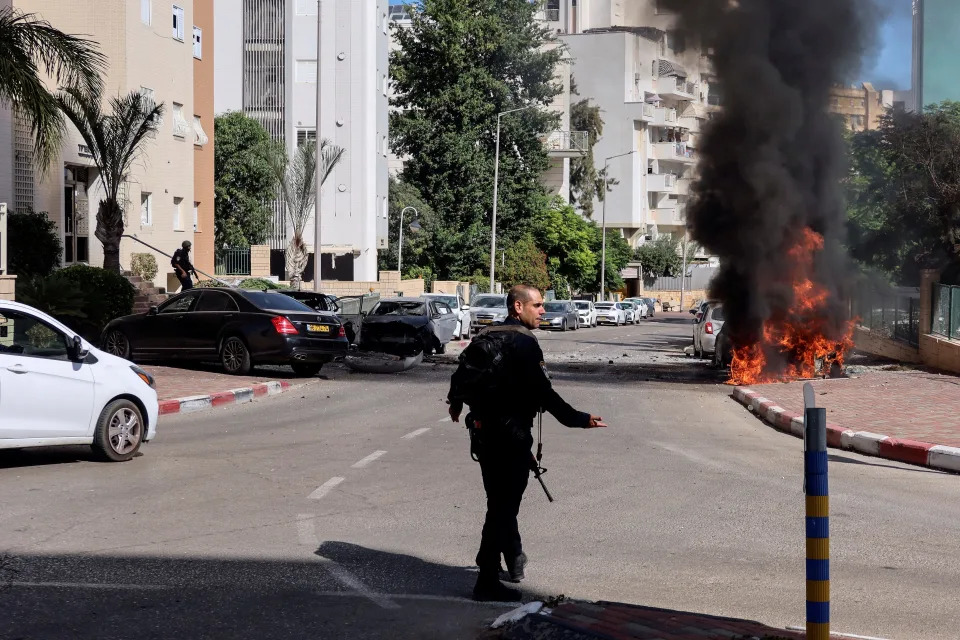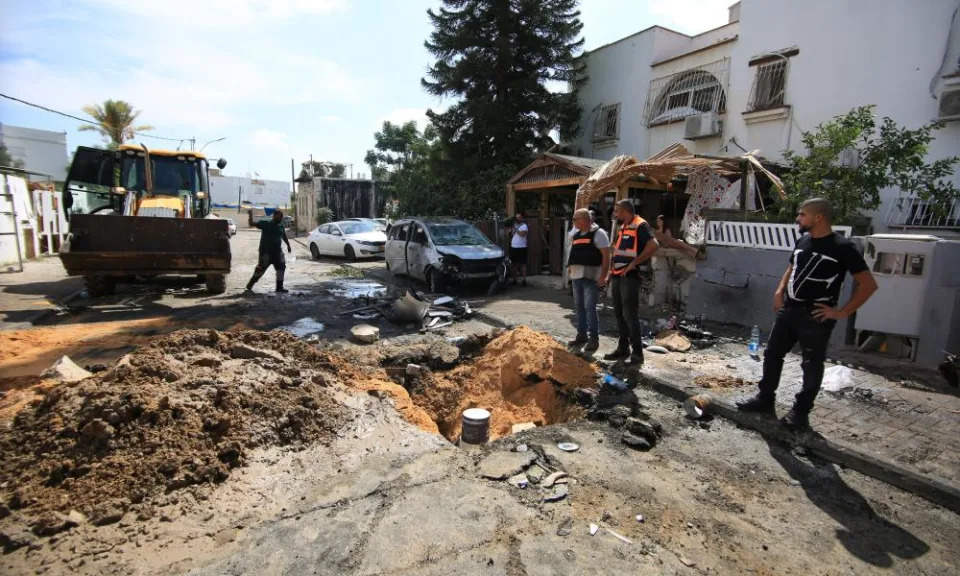Alia Shoaib
Sat, October 7, 2023

A member of Israel's police forces walks towards a fire as rockets are launched from the Gaza Strip, in Ashkelon, southern Israel October 7, 2023.Sinan Abu Mayzer/Reuters
The Hamas militant group launched a surprise multi-front attack on Israel, killing at least 40 people.
Israel's inability to anticipate the attack was a "colossal" intelligence failure, analysts say.
Israel has one of the most sophisticated intelligence networks in the Middle East.
Israel was rocked by a wave of unprecedented attacks carried out by Hamas fighters on Saturday, with reports of thousands of rockets being fired into the country and gunmen roaming the streets.
Observers have noted that Israel's failure to anticipate the attack, which likely took months of complex planning, is a failure of their famously sophisticated intelligence agencies.
"All of Israel is asking itself: Where is the IDF, where is the police, where is the security?" Eli Maron, the former head of the Israeli Navy, said on Channel 12 news, per The Times of Israel.
"It's a colossal failure; the hierarchies have simply failed, with vast consequences."
Israel is reputed to have one of the most sophisticated intelligence networks in the Middle East, comprising several key agencies and informats embedded in militant groups across the region, BBC security correspondent Frank Gardner said.
He said that Hamas being able to carry out these coordinated attacks "seemingly in total secrecy" suggests that Israel was "caught asleep at the wheel."
Israeli government officials told Gardner that a major investigation is being launched as to how Israeli intelligence failed to anticipate the attack, with one saying the investigation could go on for years.
Another BBC reporter, diplomatic correspondent Paul Adams, described it as likely to be the worst intelligence failure since the 1973 Yom Kippur war, when Egypt and Syria launched a coordinated surprise attack on Israel.
John Sparks, Sky News' international correspondent, said the wave of attacks would "unnerve" Israel, due to the scale of attacks and the level of tactical organization the Palestinian fighters could mount.
"There are pictures on social media of heavily armed in the back of pickup trucks, for example, operating within Israel. That will unnerve the authorities in Israel a great deal," he said.

Israeli soldiers work to secure residential areas following a mass-infiltration by Hamas gunmen from the Gaza Strip, in Sderot, southern Israel October 7, 2023.REUTERS/Ammar Awad
At least 40 Israelis have been killed and 740 wounded, according to local media, per the BBC.
After a barrage of rockets were fired from multiple locations in Gaza, Hamas fighters infiltrated Israel from "land, sea, and air," an IDF spokesperson said – including some by paraglider.
Israel's heavily fortified border with Gaza had been breached in several places, Army Radio reported, per The Times of Israel.
There have also been unconfirmed reports of IDF soldiers and Israeli civilians being captured by Hamas fighters and taken to Gaza.
Adams noted that this is Hamas' boldest move yet, as Gaza's ruling group have in the past typically used tactics like suicide bombs, tunnel networks, and incendiary balloons to attack Israel.
"By their standards, this was an astonishingly sophisticated — and, yes, brutal — act of hybrid warfare, using hundreds of rockets as the prelude to a mass breakout at multiple points along the normally impregnable fence," he wrote.
The IDF has operated under the assumption that Hamas would not carry out major attacks on Israel out of fear of the ferocity with which Israel would respond, The Times of Israel said, which has proved to be a misguided belief.
The attack is the deadliest to take place in Israel for years.
Hamas military commander Mohammed Deif called the attacks "Operation Al-Aqsa Storm" and said the group had "warned the enemy not to continue his aggression against the Al-Aqsa Mosque," per Haaretz.
The Al-Aqsa Mosque in Jerusalem is an important religious site for both Muslims and Jews and is often the site of clashes.
President Benjamin Netanyahu said that the country was "at war" and "will win" in a video message, suggesting a forceful retaliation is incoming.
Hamas’s murderous attack will be remembered as Israeli intelligence failure for the ages
Peter Beaumont
Sat, October 7, 2023

Photograph: Reuters
Hamas’s surprise attack on Israel, on the 50th anniversary of the Yom Kippur war, will be remembered as an intelligence failure for the ages.
In the space of several hours, dozens of Gaza militants broke through the border fence into southern Israel, surprising local military positions.
Gunmen kidnapped and murdered Israelis in the southern border communities, filming their assault as they advanced in numerous locations. In one instance, a Gaza television journalist delivered a standup report about one attack from inside Israel, an almost unthinkable moment.
While the images of several thousand rockets sectoring the sky has become familiar over the years during the periodic upticks in fighting around Gaza, the footage of Hamas assault teams moving through the streets in communities such as Sderot, blowing the gates off a kibbutz and firing on passing cars and pedestrians, showed scenes not witnessed by most Israelis, for whom short-lived attacks in cities have become a fact of life.
Related: Hacking of activists is latest in long line of cyber-attacks on Palestinians
If it is surprising it is because Israel’s surveillance of Palestinian society is both highly sophisticated and highly invasive, with monitoring of Hamas’s activity in particular one of the most important tasks for the security establishment.
As whistleblowers from the Israeli defence forces cyberwarfare 8200 Unit revealed to the Guardian and other media in 2014, the net for developing sources is almost all-encompassing in their task to identify potential informers in the occupied Palestinian territories.
They were told to seek individuals with financial and health problems, those vulnerable because of sexual impropriety, efforts duplicated in entry and exit interviews for those Palestinians allowed to leave the coastal strip.
Members of militant groups inside Israeli prisons have also historically been targeted for intelligence efforts, all of which makes Israel’s being unsighted on the planned Hamas attack all the more surprising.
Israel’s surveillance technology industry, as evidenced by the Pegasus spyware scandal, is among the most advanced in the world. Despite all of this, Hamas’s preparations were missed.
It is true that Hamas, while always determined and capable of long-term planning, has become much more skilful at adapting to the military challenges it faces, often expending large amounts of effort in its planning and in its identification of Israeli vulnerabilities, a fact very well-known to Israel’s defence forces.
While it is known from previous rounds of fighting in Gaza that Hamas has worked to develop independent and redundant military communication networks, including their own battlefield rebroadcast systems, this suggests two things.
The first is that this was planned with a level of operational security, not just within Hamas but also rival Gaza factions, unprecedented in previous rounds of fighting where at least the broad shape if not the extent of Hamas’s building-up of stockpiles has been identified and broadcast by Israel.
Military analysts have already been quick to suggest that Hamas is likely to have employed significant deception as well as the shock of attacks from multiple domains – including rocket and infiltration – to create maximum chaos.
What is clear is that at several points in the buildup, potential preparations were missed: planning, stockpiling, but most crucially, in the immediate run-up to the Hamas offensive when its fighters were mustering and approaching border areas overseen by regular patrols, cameras, ground motion sensors and remote-controlled mini-cannon in places which in the past have proved effective against attempts to storm the border fence.
All of which suggests an operation which – like previous Hamas surprise infiltration attacks including those involving tunnels into Israel – required a huge amount of preparation.
Perhaps significant is the fact – as Israeli media has pointed out – that incidents involving Hamas in recent months were not identified by the Israeli defence forces and intelligence agencies as part of a buildup to war.

People look at the damage on their street in Ramla, Israel, after a rocket attack by Hamas. Photograph: Anadolu Agency/Getty Images
Even as firefights continued with Hamas infiltrators in Israeli communities in southern Israel, the Israeli media was asking the inevitable question: how this could have been allowed to happen on the 50th anniversary of the Yom Kippur war, itself regarded as a colossal intelligence failure when Israel was attacked by an Arab coalition.
“All of Israel is asking itself: Where is the IDF, where is the police, where is the security?” asked Eli Marom, the former head of the Israeli navy, on live television. “It’s a colossal failure; the hierarchies have simply failed, with vast consequences.”
On social media and elsewhere, Israeli leaders – including the prime minister, Benjamin Netanyahu – were being openly castigated for hours from officials as the attack unfolded, a silence that was only broken by the appearance of the defence minister, Yoav Gallant.
One thing is clear, however: this attack takes place in the midst of a period of profound social dislocation for Israel. Netanyahu’s far-right government, peopled with individuals in cabinet roles who should not hold public office, such as Itamar Ben Gvir, the minister for national security, have spent their time pouring petrol on what was an already highly combustible situation in the occupied territories.
Netanyahu’s pointless and self-serving conflict with large parts of Israeli society over his much-criticised plans to undermine the country’s supreme court, even as he is in the midst of legal proceedings for allegations of corruption, has overwhelmed public debate, prompting large numbers of reservists to threaten to withhold their service.
Even when Netanyahu did finally speak, it was to reflect an Israeli political and security establishment profoundly shaken. This was not an “operation” or a “round” of fighting he stated, but a state of war.
With Hamas unable to sustain its incursion for any length of time, it seems horribly clear that it will end with maximum horror. Shock was, and is, the point.
The major question is the scope of Israel’s response. Already framed as a war, Hamas’s attack will put pressure on Netanyahu from a far right that has long pushed for a definitive attack on Gaza, perhaps ending in full reoccupation. Messages from friends in Gaza and Israel show the fear over what comes next is overwhelming.
Peter Beaumont is a former Jerusalem correspondent for the Guardian and the Observer
Peter Beaumont
Sat, October 7, 2023

Photograph: Reuters
Hamas’s surprise attack on Israel, on the 50th anniversary of the Yom Kippur war, will be remembered as an intelligence failure for the ages.
In the space of several hours, dozens of Gaza militants broke through the border fence into southern Israel, surprising local military positions.
Gunmen kidnapped and murdered Israelis in the southern border communities, filming their assault as they advanced in numerous locations. In one instance, a Gaza television journalist delivered a standup report about one attack from inside Israel, an almost unthinkable moment.
While the images of several thousand rockets sectoring the sky has become familiar over the years during the periodic upticks in fighting around Gaza, the footage of Hamas assault teams moving through the streets in communities such as Sderot, blowing the gates off a kibbutz and firing on passing cars and pedestrians, showed scenes not witnessed by most Israelis, for whom short-lived attacks in cities have become a fact of life.
Related: Hacking of activists is latest in long line of cyber-attacks on Palestinians
If it is surprising it is because Israel’s surveillance of Palestinian society is both highly sophisticated and highly invasive, with monitoring of Hamas’s activity in particular one of the most important tasks for the security establishment.
As whistleblowers from the Israeli defence forces cyberwarfare 8200 Unit revealed to the Guardian and other media in 2014, the net for developing sources is almost all-encompassing in their task to identify potential informers in the occupied Palestinian territories.
They were told to seek individuals with financial and health problems, those vulnerable because of sexual impropriety, efforts duplicated in entry and exit interviews for those Palestinians allowed to leave the coastal strip.
Members of militant groups inside Israeli prisons have also historically been targeted for intelligence efforts, all of which makes Israel’s being unsighted on the planned Hamas attack all the more surprising.
Israel’s surveillance technology industry, as evidenced by the Pegasus spyware scandal, is among the most advanced in the world. Despite all of this, Hamas’s preparations were missed.
It is true that Hamas, while always determined and capable of long-term planning, has become much more skilful at adapting to the military challenges it faces, often expending large amounts of effort in its planning and in its identification of Israeli vulnerabilities, a fact very well-known to Israel’s defence forces.
While it is known from previous rounds of fighting in Gaza that Hamas has worked to develop independent and redundant military communication networks, including their own battlefield rebroadcast systems, this suggests two things.
The first is that this was planned with a level of operational security, not just within Hamas but also rival Gaza factions, unprecedented in previous rounds of fighting where at least the broad shape if not the extent of Hamas’s building-up of stockpiles has been identified and broadcast by Israel.
Military analysts have already been quick to suggest that Hamas is likely to have employed significant deception as well as the shock of attacks from multiple domains – including rocket and infiltration – to create maximum chaos.
What is clear is that at several points in the buildup, potential preparations were missed: planning, stockpiling, but most crucially, in the immediate run-up to the Hamas offensive when its fighters were mustering and approaching border areas overseen by regular patrols, cameras, ground motion sensors and remote-controlled mini-cannon in places which in the past have proved effective against attempts to storm the border fence.
All of which suggests an operation which – like previous Hamas surprise infiltration attacks including those involving tunnels into Israel – required a huge amount of preparation.
Perhaps significant is the fact – as Israeli media has pointed out – that incidents involving Hamas in recent months were not identified by the Israeli defence forces and intelligence agencies as part of a buildup to war.

People look at the damage on their street in Ramla, Israel, after a rocket attack by Hamas. Photograph: Anadolu Agency/Getty Images
Even as firefights continued with Hamas infiltrators in Israeli communities in southern Israel, the Israeli media was asking the inevitable question: how this could have been allowed to happen on the 50th anniversary of the Yom Kippur war, itself regarded as a colossal intelligence failure when Israel was attacked by an Arab coalition.
“All of Israel is asking itself: Where is the IDF, where is the police, where is the security?” asked Eli Marom, the former head of the Israeli navy, on live television. “It’s a colossal failure; the hierarchies have simply failed, with vast consequences.”
On social media and elsewhere, Israeli leaders – including the prime minister, Benjamin Netanyahu – were being openly castigated for hours from officials as the attack unfolded, a silence that was only broken by the appearance of the defence minister, Yoav Gallant.
One thing is clear, however: this attack takes place in the midst of a period of profound social dislocation for Israel. Netanyahu’s far-right government, peopled with individuals in cabinet roles who should not hold public office, such as Itamar Ben Gvir, the minister for national security, have spent their time pouring petrol on what was an already highly combustible situation in the occupied territories.
Netanyahu’s pointless and self-serving conflict with large parts of Israeli society over his much-criticised plans to undermine the country’s supreme court, even as he is in the midst of legal proceedings for allegations of corruption, has overwhelmed public debate, prompting large numbers of reservists to threaten to withhold their service.
Even when Netanyahu did finally speak, it was to reflect an Israeli political and security establishment profoundly shaken. This was not an “operation” or a “round” of fighting he stated, but a state of war.
With Hamas unable to sustain its incursion for any length of time, it seems horribly clear that it will end with maximum horror. Shock was, and is, the point.
The major question is the scope of Israel’s response. Already framed as a war, Hamas’s attack will put pressure on Netanyahu from a far right that has long pushed for a definitive attack on Gaza, perhaps ending in full reoccupation. Messages from friends in Gaza and Israel show the fear over what comes next is overwhelming.
Peter Beaumont is a former Jerusalem correspondent for the Guardian and the Observer
No comments:
Post a Comment